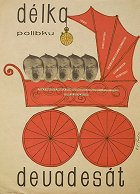Reżyseria:
Antonín MoskalykZdjęcia:
Josef NovotnýMuzyka:
Luboš FišerObsada:
Dana Syslová, Oldřich Vlach, Otomar Krejča st., Vlasta Chramostová, Lilli Janečková, Eva Svobodová, Dušan Blaškovič, Václav Babka, Zdeněk Dítě (więcej)Opisy(1)
Young married couple Eva and Jarda Tůma do not have a place of their own and cannot provide for a baby. However, nature wins and Eva becomes pregnant. At the maternity hospital, she gives birth to quintuplets. This great occasion does not escape the attention of the local and international media. The authorities decide to help support the family. They set up a commission for the care of the quintuplets, headed by Drahoslav Svitáček. The Tůmas move to a large villa with super modern furnishings. The various kinds of technical equipment do not always function perfectly and cause a lot of problems for the family. An international research centre employs Jarda, who originally worked at a children's shoe factory. Jarda secretly gives pills that the scientists would like to test on him to the experimental animals and soon the institute's buildings are filled with little rabbits, fish and monkeys. The continuous presence of complete strangers in the house does not really contribute to the peace of the family, nor does the couple's duty to fill in increasingly detailed questionnaires, enquiring about their intimate life. The state wants to increase the birth rate and the Tůmas are to be used as a model. The construction of a railway line, entirely incompetently planned by Svitáček in his previous post, is getting dangerously close to the villa. This diverts attention and Eva and Jarda have some time just for themselves. Eva gets pregnant again. Her delivery is eagerly awaited by masses of people, journalists and television crews. She gives birth to only one child. Everybody loses interest and leaves. (oficjalny tekst dystrybutora)
(więcej)Recenzje (1)
In the context of Schorm's abortion documentary Why?, which was made only a year earlier, the topic of birth rates under socialism does not lose its relevance in this film either. Indeed, the policy applied to the family at that time gave strength to relationships whose effects we are still dealing with today. This setting up of marriages and families based only on whether or not an apartment is allocated is truly futile. People would be in the mood, sure. But then what? Moskalyk dared to make an ironic film in the sixties without unnecessarily false artistic ambitions, and that is a pleasure. The length of Kissing-Time Ninety is unintentionally humorous throughout, pointing to the ephemeral life of a sensation that, under the working title of quintuplets, is as topical today as it was then. Moreover, the film features very pleasant civilian performances by Syslová and Vlach.
()
